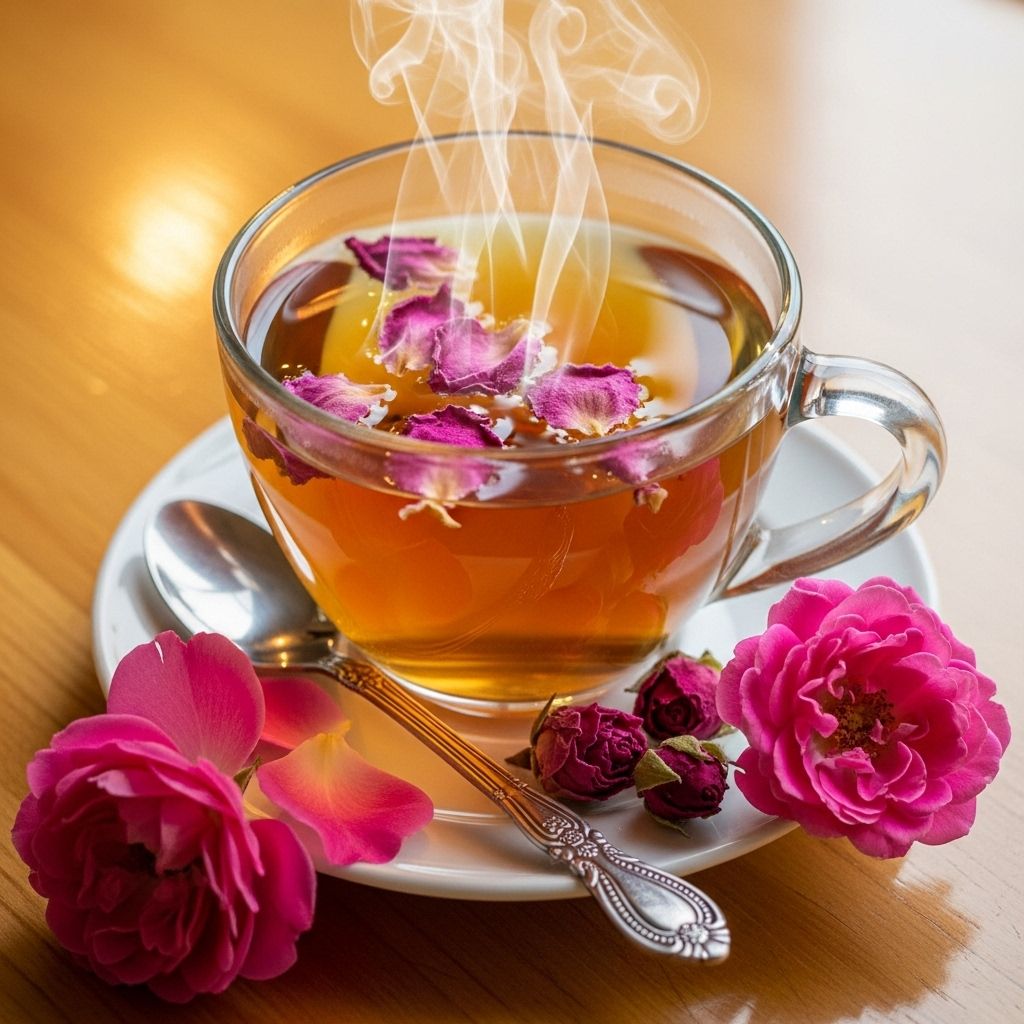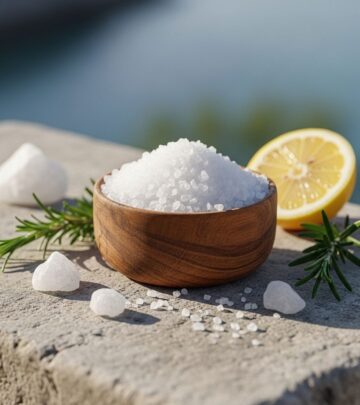13 Remarkable Health Benefits of Rose Tea You Should Know
A soothing floral infusion brimming with antioxidants and gentle daily relief.

13 Remarkable Health Benefits Of Rose Tea
Rose tea, brewed from the delicate petals of the Rosa plant, is a time-honored beverage cherished for its mild floral aroma and multitude of wellness benefits. Naturally caffeine-free and brimming with antioxidants, rose tea continues to gain popularity in holistic health circles for its capacity to support overall wellbeing. Uncover the science-backed advantages of sipping rose tea, from radiant skin to digestive harmony and beyond.
What Is Rose Tea?
Rose tea is an herbal infusion made by steeping dried rose petals or rosebuds in hot water. Its gentle, fragrant flavor and soothing color make it a preferred choice for relaxation and self-care. Unlike traditional teas from Camelia sinensis, rose tea contains no caffeine, calories, or sugar, making it an excellent drink for any time of day.
Rose tea is distinct from rosehip tea (from the fruit of the rose plant), though both confer significant health value.
Nutrition Profile Of Rose Tea
While not a significant source of macronutrients, rose tea contains trace amounts of vitamins and is particularly rich in polyphenols, a class of powerful antioxidants. Important compounds found in rose tea include:
- Gallic acid – Provides anticancer, anti-inflammatory, and analgesic effects
- Anthocyanins – Colored plant pigments supportive for urinary tract and eye health
- Kaempferol & Quercetin – Polyphenols with anti-inflammatory and antioxidant roles
- Vitamins C & E – Minor amounts beneficial for skin health when present together
Although hot water does not extract all the antioxidants, rose tea still delivers significant protection against cellular damage and oxidative stress.
13 Health Benefits of Rose Tea
Research and traditional wisdom converge to highlight a spectrum of wellness advantages packed in every cup of rose tea:
1. Rich In Antioxidants
Rose tea stands out for its high antioxidant content, notably polyphenols such as gallic acid, kaempferol, anthocyanins, and quercetin. These compounds help neutralize free radicals, reduce cell damage, and may decrease risks for premature aging, cancer, heart disease, and diabetes.
- Antioxidant activity in rose tea is often equal to or higher than that of green tea
- Supports cellular health and longevity
- Promotes overall wellness and disease protection
2. Immune System Support
The minor vitamin C content in rose petals, complemented by the potent polyphenols, enables rose tea to support immune function. Research suggests it may ease flu-like symptoms such as coughing and congestion, and its aroma potentially helps lower stress—a factor often linked to compromised immunity.
- Improves natural resistance to infections
- Protects against harmful microorganisms
3. Lower Risk Of Chronic Disease
Regular consumption of rose tea may reduce the risk of chronic conditions such as heart disease, obesity, and cognitive decline due to its polyphenol content. Polyphenols combat inflammation and oxidative damage that underlie many degenerative diseases.
- May lower cholesterol and boost cardiovascular health
- Potentially protective against diabetes, obesity, and neurodegeneration
4. Anti-Inflammatory Effects
Rose petals contain powerful anti-inflammatory agents shown to be as effective as some common medications (e.g., aspirin or ibuprofen) in certain studies. This can help manage symptoms associated with physical injury, arthritis, and other inflammatory conditions.
- Helps soothe aches and inflammation
- May act against chronic and temporary inflammatory pain
5. Relief From Menstrual Cramps
Rose tea has demonstrated efficacy in mitigating menstrual pain (dysmenorrhea). Studies of young women found that those who drank rose tea reported reduced cramping, bloating, anxiety, and mood swings compared to placebo groups.
- Natural alternative to painkillers
- Boosts emotional stability during menstruation
6. Eases Digestive Discomfort
Traditionally used in Middle Eastern cultures, rose petals help aid digestion and relieve digestive upset. The tea acts as a gentle laxative and may alleviate bloating, constipation, and other gastrointestinal disturbances.
- Promotes regularity and comfort
- May support gut flora balance
7. Natural Antimicrobial Properties
Rose petals possess antimicrobial compounds that help resist infection by harmful bacteria. Drinking rose tea may thus contribute to your body’s ability to fend off illnesses—an advantage especially valuable during cold and flu season.
- Promotes general health and wellness
- Helps protect against common sicknesses
8. Promotes Hydration
Given its caffeine-free, sugar-free nature, rose tea is an excellent source of hydration. Proper fluid intake is essential for metabolic functions, skin health, and the maintenance of energy levels.
- Supports daily water intake
- No dehydration or stimulating side effects
9. Supports Healthy Skin
Trace vitamins and antioxidants in rose tea help to promote clear, glowing skin. The vitamin E and C present may synergistically enhance skin vitality and elasticity, especially when consumed regularly.
- May reduce signs of aging
- Can improve skin texture and tone
- Potential for topical benefits with cooled tea compresses
10. Helps Reduce Anxiety & Stress
The soothing floral aroma of rose tea can calm nerves and promote emotional wellbeing. Inhaling the steam before sipping is a traditional practice believed to facilitate relaxation and reduce anxiety.
- May lower stress hormones
- Can assist with sleep quality
11. Mild Analgesic Properties
Certain phenols like gallic acid give rose tea mild analgesic (pain-relieving) effects, making it a gentle natural alternative for occasional pains or headaches.
- Helps soothe minor discomforts
- May support headache management
12. Eye Health And Memory Support
The anthocyanins found in rose tea not only enhance antioxidant activity but may also promote urinary tract health, healthy eyesight, improved memory, and healthy aging.
- Contributes to vision preservation
- Potential cognitive benefits
13. May Aid Weight Loss
While more studies are needed, the anti-inflammatory and digestive supporting activities of rose tea may contribute to weight management efforts. By helping regulate metabolism and supporting regular bowel movements, rose tea could be a gentle adjunct to a healthy lifestyle.
- May boost metabolic health
- Supports weight loss when combined with diet and exercise
Comparing Rose Tea With Rosehip Tea
| Tea Type | Main Ingredient | Key Benefits | Flavor Profile |
|---|---|---|---|
| Rose Tea | Petals/Buds | Antioxidants, stress relief, menstrual, digestion | Mild, floral, slightly sweet |
| Rosehip Tea | Rosehip Fruit | High vitamin C, antioxidants, immune support | Tart, fruity, cranberry-like |
How To Make Rose Tea
- Boil fresh water and allow to cool slightly (ideal temperature: 90–95°C / 194–203°F)
- Add 2 teaspoons of dried rose petals or buds to each cup
- Pour hot water over the petals and steep for 5–8 minutes
- Strain, sip, and enjoy. Optionally sweeten with honey or pair with other calming herbs like chamomile.
Always source organic, pesticide-free petals for the safest and most aromatic brew.
Possible Side Effects & Precautions
- Rose tea is considered safe for most people when consumed in moderation.
- Individuals with flower allergies should exercise caution.
- Pregnant or breastfeeding women, or those on medication, should consult a healthcare provider before use.
- Excessive intake may cause mild digestive effects such as stomach upset.
Frequently Asked Questions (FAQs) About Rose Tea
Q: Can rose tea help with skin problems?
A: Rose tea’s antioxidants and minor vitamin content may support clearer, more radiant skin and reduce signs of aging.
Q: Does rose tea contain caffeine?
A: No, rose tea is naturally caffeine-free and suitable for people avoiding stimulants.
Q: Is it safe for children and seniors?
A: When prepared with organic petals and consumed in reasonable amounts, rose tea is generally considered safe for most age groups. Always check for possible allergies and consult a healthcare provider if uncertain.
Q: Can rose tea help with anxiety?
A: Yes, research suggests rose tea and its aroma have relaxing effects and may help reduce anxiety and stress levels.
Q: How often should I drink rose tea?
A: Up to 2–3 cups daily is typical for most people. Listen to your body’s response and adjust accordingly. For medicinal or specific health objectives, consult your doctor.
Q: Are there environmental or ethical considerations?
A: Choose organically grown, ethically harvested rose petals to promote sustainable, chemical-free farming and fair labor practices.
Conclusion
From ancient healing rituals to cutting-edge studies, rose tea continues to impress as a gentle yet potent force for holistic health. Whether seeking relief from cramps, supporting digestive harmony, pursuing antioxidant protection, or simply desiring a calming evening ritual, a daily cup of rose tea is a simple, flavorful way to nurture body and mind.
References
- https://www.webmd.com/diet/rose-tea-good-for-you
- https://www.healthline.com/nutrition/rose-tea
- https://artfultea.com/blogs/wellness/flower-power-rose-tea-benefits
- https://senchateabar.com/blogs/blog/rose-bud-tea
- https://pmc.ncbi.nlm.nih.gov/articles/PMC10758878/
- https://pmc.ncbi.nlm.nih.gov/articles/PMC11954921/
- https://clubmagichour.com/blogs/news/the-magic-of-rose-tea-ancient-beauty-medicine-for-modern-wellness
Read full bio of medha deb












